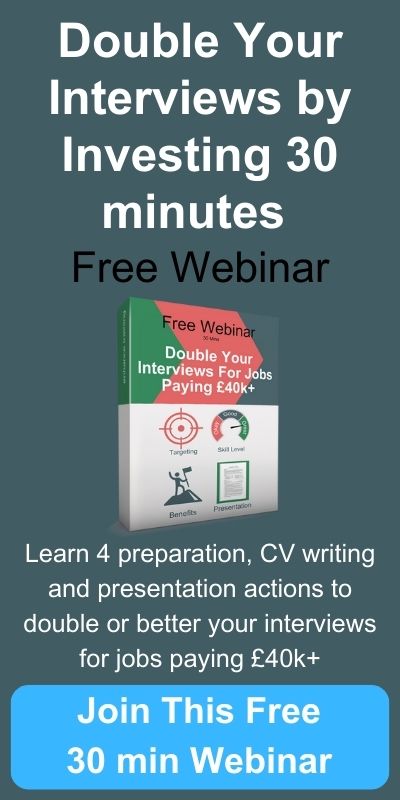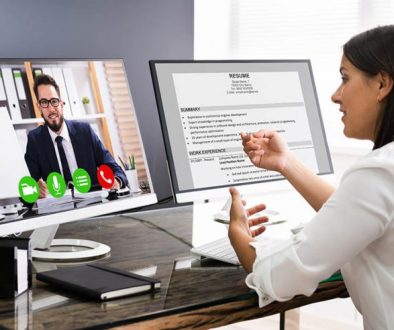How do you prepare for an interview? Interviews are competitive – sometimes very competitive – so how you prepare for an interview makes the difference between getting that job offer or not. And the higher up the career ladder you do, the competition gets tougher because there are less jobs and the competition is better and just like you.
In this article, we share how much preparation you should do for professional level jobs and above, the four key factors that will decide if you pass or fail, and I give you nine key tips for preparing for your interview.
Interview preparation is about WHAT to do and HOW MUCH of it to do. Let’s cover the easiest of these two first.
How much Preparation should I do
The preparation really depends on how much competition there is for the role you are applying to and how good the other candidates are compared to you – both in doing the job and their interview technique.
One of my friends went for a job at BP straight out of university. He got one of two jobs out of 4,000 applicants. I haven’t come across that level of competition since, at any level, from graduate to director level.
And it is very hard to estimate what preparation the other candidates will do.
LEARN YOUR WAY:
To give you an idea of what the average person does, a survey asked 1,500 mid-level professionals how long they spent preparing for interviews, with the following results:
- 60% spend four hours or less preparing for a job interview.
- 28% spend between five and nine hours preparing for a job interview.
- Only 12% spend ten hours or more preparing for a job interview.
So based on this, we suggest that you spend at least 10 hours preparing. This simply gives you a better chance of getting into the top 10% of candidates at interview. If you are not in the top 10% then you are much less likely to be considered for a job offer.
In short, you can’t really spend enough time preparing. If you have a day job already, then it is a real challenge to fit in your preparation time. When you get home from a long day at work, interview preparation is probably the last thing you want to spend your evening doing.
Think about the goal of getting your target job. What will it mean in terms of moving your career forward, challenge, extra pay, social status or whatever you value most about having it? Put the hours it, it really is worth it!
So this brings us onto the next challenge – what to do with the time we do spend preparing.
How to prepare for interview
There are several different routes to preparing well for interviews. Your preparation should have started well before you started writing your CV.
You have done well on this stage to get to interview so we won’t dwell too much on pre-CV writing preparation other than to stay that understanding your strengths or best points AND being able to talk clearly about them is critical.
Without this step, all the other steps are a lot harder to do and take longer and you probably don’t get as good an outcome at the end of it.
So let’s go through 4 critical factors that will decide if you pass or fail at interview. Make sure you have each covered when preparing for your interviews.
Critical requirements for passing interviews
Confidence in yourself:
You need to be confident in what you are telling the interviewer. After all, if you are not confident in what you are saying, then the interviewer will not be confident in you.
If you are calm, clear in what you are saying and deal with the follow up questions without getting flustered or losing your confidence, you will be doing fine.
You get confident by working out what you are saying to all the typical questions that are likely to be asked and then practicing your answers. If you want more information on how to approach this, see our How to ACE an Interview course.
Excitement for the role and the team you will be joining
If you are not excited about the role and the team you will be joining, then you are probably going after the wrong job or applying to the wrong team.
You have to be interested, excited and keen on the role and the people you are going to be working with. This shows through during the interview and is very hard to fake.
As an interviewer, I nearly always put keenness and team fit ahead of ability. If you are keen, you will be hungry to learn. If you fit in with the team, you are will be happier and do a better job. This is all about attitude and approach, both of which are very hard to teach.
The knowledge or experience to do a task can be learnt much more easily in comparison.
If you are not keen, then the interviewer will not be keen on you. It is that simple.
Your ability to do the job
This may be an obvious requirement. Many people can write a good story on paper or their CV. The interviewer will check your story as much as they can through asking questions and requesting examples.
Select your examples with care and position each in terms of how it helps the company or team be successful.
Expect follow up question on the examples that you give. It is harder to prepare for the follow-up questions than the initial question. This helps the interviewer separate the okay from the good. Try to anticipate as many of the follow-up questions as you can and prepare answers.
You have to leave the interviewer with little or no doubt that you can do the job you are applying for.
This does not mean that you have to have done the job before. You will need to have done 60-70% + of the tasks and responsibilities that make up the job before. This percentage climbs the more competition there is for the role.
Interview Technique
Interview technique is an under practiced skill. After all, most of us only apply for a new job every 3-5 years. Therefore how important is it to practice your technique really?
Actually, it is very important. Imagine going into a high school exam having done no exam practice. Would you expect to pass? Interviews are very similar. Knowing how to answer each question is at least 60%+ of the difference between those that pass or get the job offer and those that don’t.
I have sat in over 1,000 interviews as a hiring manager, and there have been so many times that I suspect a person will be pretty good at their job, but I can’t offer it to them because another candidate has made the effort to show they are good at their job. They have made more effort for the interview, so I assume they will make more effort when they actually do the job.
Making the effort to learn interview technique strongly indicates they will make the effort to be good at their job too. That is always pretty desirable in an employee. To learn more about improving your interview technique, see our courses.
Want More Job Hunting Content?
Sign up to our weekly newsletter sharing our new content.
Look out for our confirmation email in your inbox
Tips to Prepare for an Interview
Here are some key tips for how to prepare for an interview and improve your interview performance:
- Choose the right job for you with the right type of company. This is where your research comes into its own.
- Research the opportunity you are applying to. Make sure you know about the company, the people you are meeting, recent news articles, what’s on their website etc.
- Positioning your stories, examples, strengths and achievements in the right way for the job you are applying too is an important step. Don’t move on until you are happy. Get help from friends, books, or courses to help you do this if you are struggling.
- Practice your answers to all the typical interview questions before you start going to interview. If you need help in this area, look at our Interview Question Bank.
- Get your interview outfit or outfits (formal and smart casual) ready well in advance so you know exactly what you are going to wear.
- Plan the route and make sure you know exactly where you need to be for the interview and turn up early.
- Smile, make good eye contact and prepare some starters for small talk to help you (and your interviewer) relax.
- Enjoy the interview – you are finding out more about the company and people as well as getting one step closer to that job offer that you want.
- When you get the job offer, get back to the company quickly with a yes and start negotiating your offer as needed. You want them to know that you are keen on taking the role (if you are of course).
In summary
Knowing how to prepare for interview makes a big difference to the quality of your interview preparation. The better than you get at interviews and the job hunting process, the more jobs will be available to you, the better jobs become available, and the quicker your career progression.
Interview skills as an essential skill set to develop to move your career forward. There are many other skills needed too of course and you have to deliver results and value to your employer.
It is possible to improve your interview skills fairly quickly with the right preparation. It takes a lot longer to develop your achievements, on the job skills and experience. Both are important to your career advancement.
Good luck in your job hunting!








